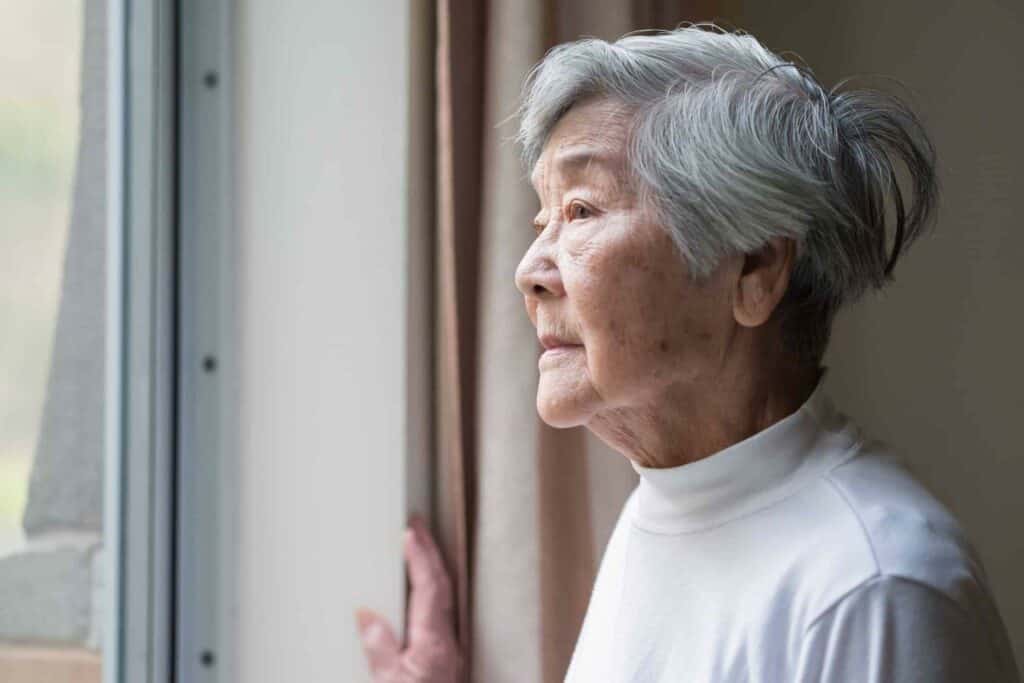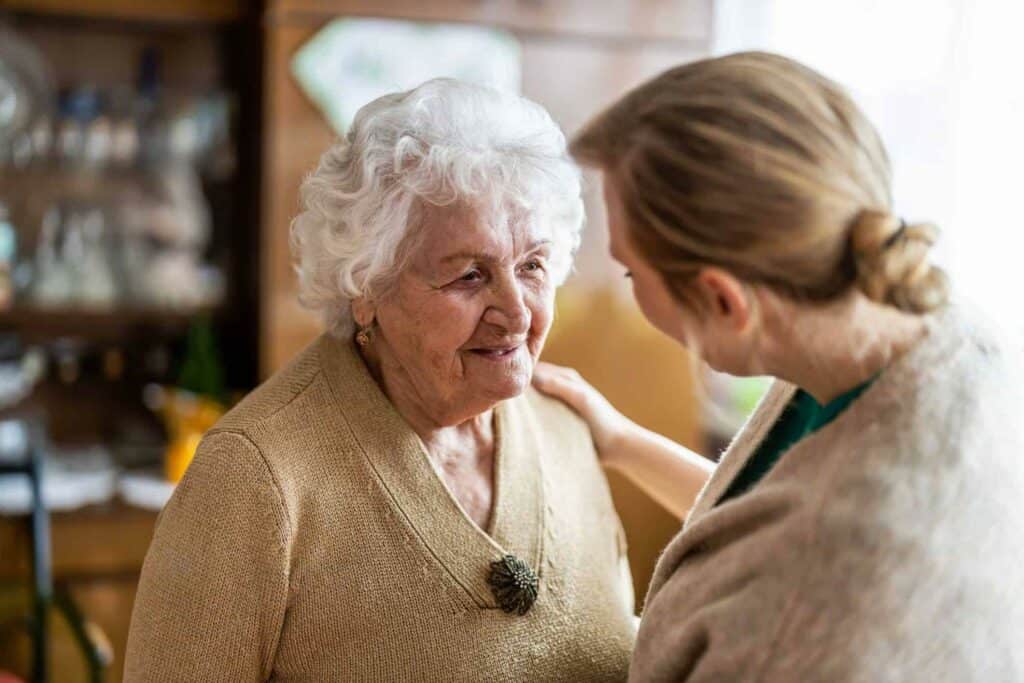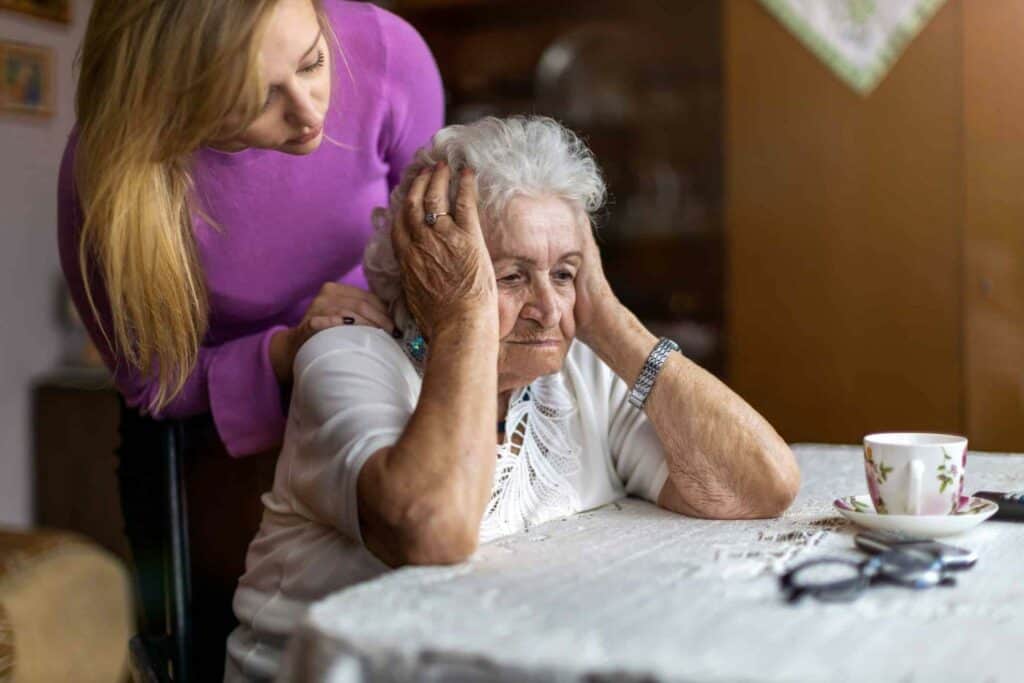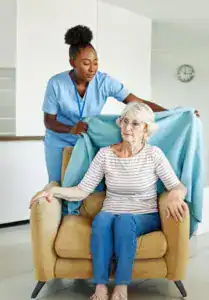
25+ Joyful Indoor Activities for Seniors That Will Transform Their Day
As seasons change in Reno and Carson City, or when mobility becomes a challenge, finding engaging indoor activities for seniors can feel like a difficult

Sundowning is a phenomenon happening to people with cognitive impairment. During the late afternoon until evening, they experience increased confusion, agitation, and disorientation, affecting their behavior and mood. The catalyst to this is the changes in the brain due to dementia and Alzheimer’s that shift a senior’s biological clock. Its symptoms can vary from mild, like anxiety, to serious ones, like wandering and hallucinations.
Sundowning is not well understood. Until now, experts continue to do brain studies to gain a deeper understanding of how some changes can manifest in unique symptoms, like sundowning.
Like dementia, its main condition, the primary cause of sundowning remains unknown, but multiple hypotheses exist as to why it happens, such as:
One or a combination of these factors can lead to sundowners syndrome. As many as 20% of dementia and Alzheimer’s patients experience this phenomenon.
Understanding triggers can be one of the keys to managing sundowning symptoms. Here are what experts believe can prompt the appearance of symptoms.
One or more factors can escalate to sundowning or worsen existing symptoms. If your loved one experiences sundowning, try identifying the triggers, as they will help you get a baseline for treatment.
Experts believe the lack of natural light is the main contributor to sundowning. In senior living facilities, where most residents stay in sheltered buildings and only get an opportunity to go outdoors if they join a fitness class, sundowning can likely occur.
This factor is also closely related to the circadian rhythm, as insufficient exposure to natural light for a long time can intercept the body clock’s function.
Nine studies about the effects of light found evidence that the lack of exposure to the sun was associated with worsening psychological symptoms and even disrupted circadian rhythm functions of residents with dementia living in care homes.
The study concludes that inadequate exposure to natural light could be a risk factor for sundowning with dementia patients. It’s proposed that factors like increasing exposure to natural light, adjusting environmental settings, and scheduling activities during the day should be part of the treatment plan to ease sundowning.

People with dementia exhibit a spectrum of symptoms, varying from behavioral, physical, and psychological. If you live with your loved one with dementia, it’s easy for you to spot the different symptoms and connect them with sundowning. But if your loved one resides in an assisted or memory care facility, you’ll have to regularly communicate with their caregiver to get updates about your loved one’s health situation.
Behavioral and mental indications of sundowning can include:
If you suspect your loved one is experiencing sundowning, you should see a combination of these symptoms on display.
On the other hand, physical indications of sundowning translate into these different symptoms.
Physical, behavioral, and cognitive symptoms can manifest simultaneously. Look out for these signs to diagnose sundowning on your loved one.
It’s not tricky to pinpoint whether symptoms are general dementia or sundowning-related. Dementia and sundowning have shared symptoms, as the latter stems from the former. Still, one apparent indication can tell that symptoms are caused by sundowning.
Signs of sundowning are more prominent as the sun sets, specifically in the late afternoon and early evening. During this time, your loved one can feel more confused, anxious, and likely to wander. Timing is your main cue to differentiate between dementia and sundowning.

Sundowning has several implications for the person who has it, their family, and primary caregivers. As some symptoms can be challenging to manage — even unsafe — for the patient, constant monitoring and supervision are crucial to ensure safety.
Sundowning causes complex symptoms such as restlessness, mood swings, and aggressiveness, making daily activities or communication more challenging. Sleep deprivation is another common concern that can worsen sundowning and overall dementia. Wandering can also put your loved one at risk.
Sundowning happens more frequently during the middle or later stages of the disease. If cognitive signs compromise your loved one’s safety, moving them to a facility with caregivers that provide around-the-clock care and supervision is the best solution.
The syndrome also has a direct impact on the caregivers. They’re confronted with heightened challenges when symptoms manifest, escalating the demand for care and monitoring to 24 hours.
For resident-dwelling dementia patients, the facility can provide the 24-hour care they need. For family caregivers, taking care of a loved one with dementia who also manifests sundowning can be taxing. The soaring demand for care can affect their career, health, and other aspects of life. Increased stress levels can take a toll on the family caregiver’s health.
Treatment methods to manage sundowning symptoms are integral for the patient to live a good quality of life and dodge some safety risks.
Dementia is a condition with several complex symptoms or syndromes that coexist with it. It means a slight negative change in the patient’s health can advance dementia, worsen the symptoms, and sometimes lead to early mortality.
For a disease like cognitive impairment, a holistic approach to care matters significantly in preserving life. The person can live longer by evaluating their mental, physical, social, and spiritual needs and providing for care deficiencies. On average, a person with Alzheimer’s lives 4 to 8 years. Yet with sufficient care, they can extend their lifespan, delay the disease progress, and live as long as 20 years.
Sundowning can speed up dementia, so managing the syndrome can slow down the trajectory of the disease.

Like dementia, sundowning has no cure. However, treatment options are available to reduce the frequency and manifestation of symptoms.
One risk factor of dementia is a sudden change in the routine. It can be hard to adjust to unpredictable situations when a specific part of the brain needed for adaptability skills is damaged. At worst, a spontaneous change in their daily schedule can increase confusion and agitation.
Stick to a consistent routine to manage sundowning. Make meal times, bedtime, and activities predictable. This way, your loved one knows what series of tasks to do next. If you need to introduce a new habit, do it gradually.
A noisy, cluttered environment can trigger dementia and sundowning symptoms. In contrast, providing a peaceful atmosphere can lessen agitation and stress. Avoid public places, like malls or restaurants. If you need to go out or dine at a restaurant, choose a non-peak hour or day.
Several activity options can help your loved one stay physically, mentally, and socially active. Incorporate aromatherapy to engage the senses, reading a book to stimulate cognition, and listening to soft music to encourage relaxation.
Doing things they already do before they get dementia diagnosis offers a sense of familiarity, making it easier for them to adapt.
A study revealed that music with about 60 beats per minute results in alpha brain waves present in people when they’re conscious yet relaxed. Music is an excellent tool to induce sleep. In fact, listening to some calming music may change brain function to the same extent as medications.
Bright light therapy, in particular, may help treat agitation and stabilize the depressive mood of seniors with dementia. It can support and regulate the body’s biological clock to improve sleep and wake cycles for those with sundowning syndrome.
Light therapy is a safe method but is underutilized because of how limited the studies are to prove its effectiveness. Experts are considering implementing it as a primary or supplemental treatment to ease dementia symptoms.
Drug interventions for sundowning are limited to treating accompanying symptoms. Antidepressants can help ease mood swings and minimize agitation, and anti-anxiety medications can soothe anxious feelings and restlessness. Doctors may prescribe sleeping pills to treat insomnia.
Depending on the manifesting symptoms and their severity, the healthcare provider may put your loved one on drug therapy.

Dementia caregivers are the best people to deal with sundowning and dementia symptoms. They’re trained to manage and respond appropriately to the challenges associated with sundowning.
You can hire a dementia caregiver or move your loved one to a memory care facility where their schedule can easily be regulated. Good sleeping habits can balance the circadian rhythm and prevent sundowning. The goal is to sync the body clock with environment cues.
Napping late in the afternoon can intercept the internal clock and cause insomnia during bedtime. Avoid doing this, and make sure your loved one spends at least 150 minutes of moderate-intensity fitness training per week. Physical activities can promote better sleep.
Integrating daily activities and meaningful interactions into your loved one’s routine can increase their happiness and minimize sundowning symptoms. Memory care facilities have organized programs designed for people with cognitive decline. These events are primarily done in groups, making them excellent opportunities to hone your loved one’s social skills.
A person with memory loss impairment will likely feel down, isolated, and depressed. Families, caregivers, and staff at a long-term facility can help provide emotional support to uplift their mood and reduce the risk of loneliness and isolation.
As a family caregiver, you must reassure your senior mom or dad that you’re always there if they need your support.
Caregiver stress can be toned down if you ask for external help. In most cases, adult children move their loved ones to a home that provides all-inclusive care and services suited for people with neurological diseases. Such a decision substantially mitigates caregiver stress and other mental health problems.

Hiring the right professionals differentiates burned-out family caregivers from happy ones. Dementia is a highly demanding condition, and more hands on the care deck mean stress is divided between various people. This strategy reduces the physical and emotional impact on family members, allowing them to continue their daily lives without interruptions.
After a dementia diagnosis or before sundowning symptoms emerge, talk with the care team and dementia specialists to get advice on your loved one’s health situation. Obtaining the correct information is crucial to properly managing dementia. These professionals can recommend strategies to delay cognitive symptoms and extend your loved one’s lifespan. On top of that, it makes the disease journey more manageable.
Assisted and memory living facilities provide the best environments for older adults with dementia. They have private spaces with easy-navigable floor plans, ideal to help your loved one know their way around. Security measures are also in place, like secured entrances and exits, wearable tracking devices, and keycard-operated doors to prevent injuries and accidents. The bathrooms and outdoor walkways have grab bars to support those with mobility restrictions. These communities help reduce the adverse effects of dementia on your entire family.
Respite services can alleviate your stress if you’re the primary caregiver. Ideally, you’d want to transition to an assisted home or memory care community when dementia progresses to mild or severe. But at an early stage, the home may suffice as a living environment for your loved one. You can then get assistance by employing in-home care services to provide for your loved one’s care needs at their own residence.
Support groups are vital for all caregivers as a source of emotional support. Since caregiving is physically and emotionally taxing, having a support group where you can share tips or experiences with co-caregivers can alleviate exhaustion.

Dementia impacts the entire family. Some adult daughters even quit their 9 to 5 jobs to be full-time caregivers. It shows that to manage a complex disorder such as dementia, you need to fully commit to the role and be there for your loved ones right when they need you. Since you can’t delay care provision, especially at the disease’s critical stage, around-the-clock monitoring and care is crucial.
Some symptoms can be challenging to manage, like sundowning, as your loved one will likely behave like a different person. They can be aggressive and violent at times. The diseases cause this, and they’re mostly unaware of how they behave. Hence, Amy’s Eden is here to help your loved one with dementia and Alzheimer’s. If they want to age in place and spend their remaining years with family members, our trained caregivers will go above and beyond to provide compassionate care and ensure they live a meaningful life throughout.
Contact us today to learn more about our dementia care services.
Get care >

As seasons change in Reno and Carson City, or when mobility becomes a challenge, finding engaging indoor activities for seniors can feel like a difficult
Family Survey Please share your honest feedback to help us improve the care and safety of your loved one.
Professional Senior In-Home Care in Carson City Keep your loved one in the comfort of their cherished home. Amy’s Eden delivers exceptional senior care services

The Best Home Care in Reno, NV The comfort of your home, the quality of Eden. We provide compassionate, professional in-home care services for seniors
